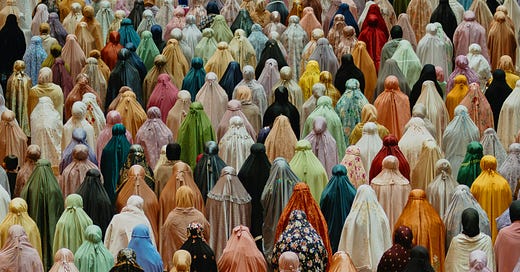This year, instead of celebrating International Women’s Day, we are left questioning whether this movement was ever meant to truly empower and amplify diverse women and perspectives.
It is 2025 and there has been a notable absence of Arab and/or Muslim voices at IWD events where they were once prominently featured, prompting us to invite women to share their firsthand experiences. The responses have been overwhelming.
Muslim Agenda surveyed over two dozen Muslim, Arab and/or pro-Palestinian women and the outcome is damning. All participants who were vocal about the Gaza genocide noticed less engagement with their work post 7 October 2023, revealing a strong correlation to their being censored, uninvited and unrepresented from IWD events.
They noted they had lost job opportunities, and have been quietly uninvited from the very events that once celebrated them.
Several women have chosen to remain anonymous.
Muslim Agenda’s survey highlighted that much of the feminist and domestic violence sectors have devoted significantly less attention and effort to addressing the experiences of migrant women and culturally and linguistically diverse (CALD) communities.
For Amani Haydar, an advocate, artist and award-winning writer, March is usually filled with IWD events. However, this year she notes there has been a significant drop in invitations, affirming that there has been a shift in the representations of Arab and/or Muslim voices post October 7.
“I have lived experience of Israeli violence and that has always been a visible and important part of my work.
“To myself and my peers, it appears that organisations may be capitulating to external pressure,” Haydar said.
Sara Mansour, community leader, lawyer and co-director of Muslim Agenda, reflects that “it feels like an indictment of Western feminism that proffers it wants to empower and unshackle women, especially women of colour and Muslim women, yet when we exercise those freedoms – including freedom of speech – in a way that challenges hegemony, we are spurned.”
In the West, intersectional feminism is widely taught and propagated as a barometer of inclusion, yet it remains a fallacy, especially as Western institutions fail to acknowledge the lived experiences of diverse women.
Instead, these institutions prioritise superficial inclusion to ensure a diversity quota is met. Amna K Hassan, a consultant and public figure who has worked for the last fifteen years to develop safe and inclusive spaces for minority and diverse communities, highlights this.
“Cultural diversity was a bonus if the woman ticked one of the other boxes, but it definitely is not considered important with no real commitment. It's actually quite sad because it's whitewashed, and not reflective of intersectional feminism at all.”
Allies to the development of diverse women’s rights, particularly in advocating for the rights of Palestinian women have also faced the brunt of this exclusion.
When women, particularly women of colour, advocate for women in Gaza who face unthinkable circumstances, they are uninvited and no longer given a seat at the round table, and thus intersectional feminism truly becomes a facade.
Aishah Ali – lawyer, poet and co-director of Muslim Agenda, highlights the significant ramifications of being excluded from such spaces.
“These opportunities were not only a means of important secondary income, but also a direct way to interact with particular echelons of the community that wouldn't be exposed to Muslims, particularly Muslim women.
“There is a strong regression in the representation of Muslims in these echelons that has trickle down effects on the public perception of Muslims,” Ali highlighted.
Beyond IWD, women who advocate for Palestine have also faced the repercussions for their intersectional advocacy. Sarah A*, an author, said that “speaking engagements in schools definitely dropped. I had 14 speaking engagements just in book week in 2023, and in 2024 I had one. This year I have nothing, with the exception of my old school and one other Catholic school.”
Shereen Kassir, an optometrist and influencer noted that fashion labels “were very keen for Muslim representation” pre-October 7, but this “has since shifted and [they] have distanced themselves.”
The reality is that mainstream Western feminism does not champion all women. It supports women who align with the status quo to ensure a more palatable version of empowerment, and it embraces diverse women only if they do not challenge dominant narratives.
This has become increasingly obvious to Arab, Muslim and/or pro-Palestinian women this year, particularly as “anti-Palestinian narratives are peddled by the media, painting pro-Palestinian supporters as aggressive and controversial,” said Aishah Ali.
These narratives ensure Muslim and/or Arab women and their allies are stripped of opportunities to speak, be seen or exercise their agency. This exclusion not only highlights the performative nature of Western feminism, but it leaves our communities with a heightened anxiety, wondering about the future and their place in it.
It seems that International Women’s Day has a long way to go after all.
NOTE: October 7 is used as a marker of time to highlight the exponential growth in mistreatment of diverse women in feminist and leadership roles. The ethnic cleansing of Palestinians has been ongoing since 1948.
*Names are included with the participants’ consent.
Main photo by Mohammed Alim.






Such an incredibly important piece, and written with such depth!!!
‼️‼️